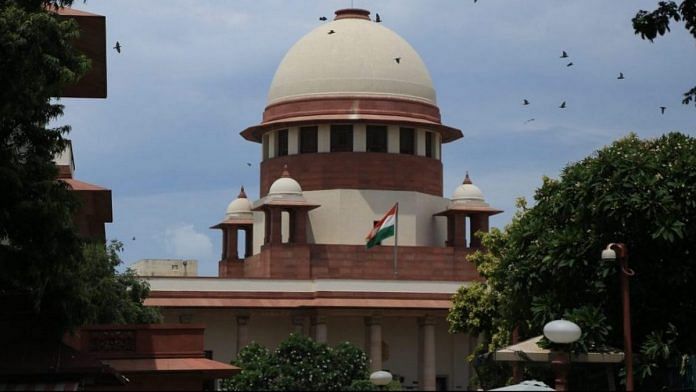New Delhi: The Centre Wednesday welcomed the suggestion to fix a time-frame to conclude trial of criminal cases, including corruption cases, against sitting and former lawmakers.
A bench led by Justice N.V. Ramana was hearing a public interest litigation (PIL) filed by advocate Ashwini Kumar Upadhyay, demanding fast-tracking of cases involving MPs/MLAs, when Solicitor General Tushar Mehta said the top court should fix a time-frame for completion of trials.
Mehta supported senior advocate Vijay Hansaria’s report, suggesting a one-year deadline to conclude trials in such cases. Hansaria is assisting the bench in the matter.
‘More special courts needed’
The government’s second top law officer also said that funds for developing infrastructure was not a problem. “The cases must reach its logical conclusion in a time-bound manner. We are ready to give funds for video conferencing, more examination rooms, for the appointment of public prosecutor and presiding officers,” Mehta told the bench.
He, however, asked the court not to include directions regarding costs of setting up logistics in its order, as and when it is delivered. Justice Ramana asked him whether the Centre was serious about disposing pending cases. “Hundred percent,” Mehta replied.
This was after Hansaria proposed an increase in the number of special courts — there currently 12 and operating in nine states: One each in Andhra Pradesh, Karnataka, Madhya Pradesh, Tamil Nadu, Telangana, Uttar Pradesh, West Bengal and two in Delhi. There are also three special courts at the magisterial level in Maharashtra, Kerala and Delhi.
Hansaria emphasised the need for more special courts — one in each district — so that witnesses do not have to travel long distances to depose in cases. He said non-appearance of witnesses is one of the major reasons for the delay in trial.
Also read: SC invites bids for system to allow virtual and physical hearings at the same time
HCs asked to submit blueprint to expedite trials
With 4,600 cases awaiting a final disposal, including 175 corruption and 14 money laundering cases, 12 special courts are not sufficient, Hansaria submitted. Of these, 2,556 cases against sitting MPs and MLAs are yet to be decided. Some of the cases pending were registered in the 1980s, the court had observed during a hearing last week.
After a state-wise analysis, Hansaria submitted a list of recommendations to the court, one of which suggests asking the high courts to prepare a blueprint for expeditious trial. He also said that a presiding judicial officer with a minimum fixed tenure of over two years and a dedicated top court in every district be the nodal prosecuting officer.
The Chief Justice of the High Court may be personally requested to look into the matter and submit an action plan, Hansaria told the court during the hearing.
He also said there was no uniformity regarding special courts for hearing cases pertaining to the legislators. His report gave instances of states such as Madhya Pradesh where one court is hearing 184 cases. Similarly, Tamil Nadu has earmarked one special court for 78 cases, while 246 other cases involving legislators remain pending in various trial courts across 31 districts.
The bench appeared convinced with the senior lawyer’s suggestion. “There are issues when only one court in a state is hearing all cases. They (courts) are not accessible to witnesses,” the bench said.
Finally, it decided to call for suggestions from all high courts, based on which it will pass detailed orders for fast-tracking these cases.
Advocate Sneha Kalita, associate of Hansaria, told ThePrint, “The high courts have a difficult task set out now. They will have to prepare a roadmap that will take care of several issues, including appointment of dedicated judges and public prosecutors.”
She also appreciated Centre’s stand in the matter. “Most of the problem will be solved if adequate funds are released and utilised in a proper way. The high courts need to monitor this as well.”
Also read: Let virtual courts continue after pandemic, they are safer & faster, parliamentary panel says



